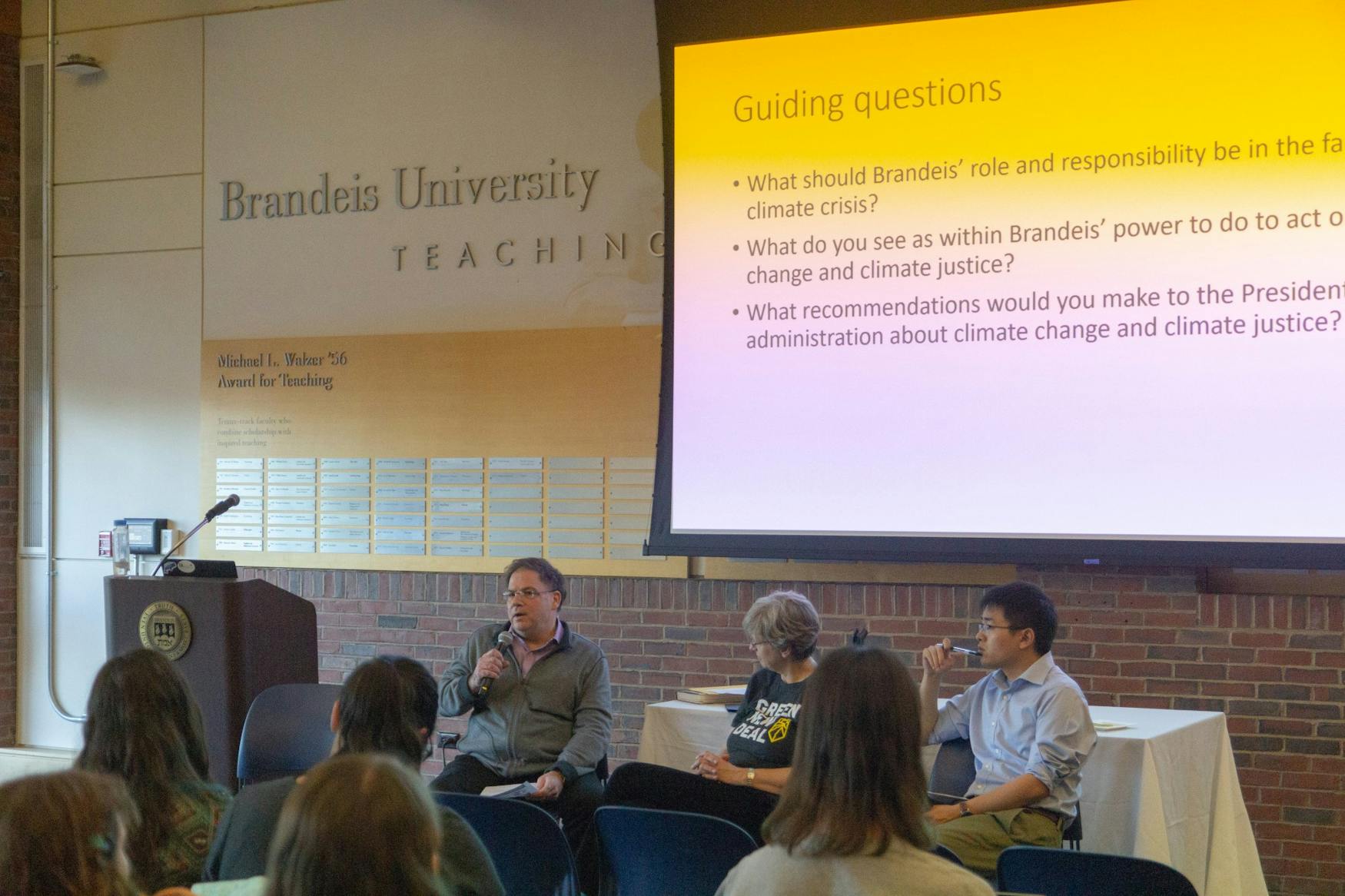Working group talks sustainability with Brandeis students and faculty
The Community Engagement group discussed the current climate situation and plans for the future.
The Community Engagement Working Group of the President’s Task Force on Campus Sustainability hosted a community forum about climate change last Monday with the goal of garnering the recommendations and opinions of both students and faculty on sustainability at Brandeis, and providing context of the University’s current situation.
Currently, Brandeis is in the process of renewing its Climate Action Plan, which was last updated in 2015. In reference to this latest version, the Manager of Sustainability Programs on Campus Mary Fischer said, “It doesn’t quite go deep enough and we didn’t quite hit our goals.” She said the hope is that the renewed Climate Action Plan will “go deeper” and “talk about the bigger question of ‘what Brandeis should be doing in the face of this climate crisis.’” The task force will be including the community's ideas from the forum in its recommendations to the administration in order to better revise the plan.
Before opening the forum up to discussion, Fischer explained the breakdown of the University’s carbon footprint from the past year. About 70% of carbon use, she said, comes from the electricity and natural gas used in campus buildings, along with smaller amounts of gas used in campus vehicles and oil. Other notable sources of carbon use –– about 28.2% in total –– are commutes, solid waste, paper products and food.
Focusing on food, which takes up at least 7% of the total carbon footprint, Fischer said that the carbon footprint of the major food categories Sodexo purchased in the 2017-2018 school year was 2,540 tonnes, with a physical weight of 361 tonnes. About half of this carbon footprint was due to beef alone. “It’s just an interesting way to think about what we actually purchase and consume and what the footprint of that is,” she said.
To guide the discussion, Fischer proposed a few questions: “What should Brandeis’ role and responsibility be in the face of the climate crisis?”; “What do you see as within Brandeis’ power to do to act on climate change and climate justice”; and “What recommendations would you make to the president and the administration about climate change and climate justice?”
Prof. Ben Gomes-Casseres (IBS) answered, saying, “To me it’s about our core mission, which is education.” He explained that because climate change affects everyone, the International Business School is including references to climate change in many of its courses, even opening some up to the campus community to celebrate Brandeis’ Climate Change Week, which will occur from March 30 to April 3. Every discipline should be dealing with climate change and empowering students “to do something about it using the skills [they] came here to learn,” Gomes-Casseres said. “I think Brandeis’ role is basically to have that infuse in our learning and our teaching.”
Prof. James Ji (ENVS, ECON), a Florence Levy Kay Fellow in Environmental Economics, answered next, saying that Brandeis should be researching more and “pushing the frontiers of what we know about climate change.” He also further emphasized the impact of climate change, explaining that it affects everything from emergency rooms to test scores. Ji said that the Brandeis community has a “social responsibility” when it comes to the climate crisis.
“We have a role to play, either by knowing our own carbon footprint or by pushing for changes around the area, whether its policy changes, activism or other types of changes. We can do this,” he said.
Prof. Sabine von Mering (GRALL, WGS, ENVS) asked the audience for ideas to improve sustainability. One audience member emphasized the importance of education on climate change.
“Why we have gone through two major transformations of the curriculum in the last twelve years and we still don’t have a required entry level climate course is something I can’t figure out by myself,” she said.
Some of the other suggestions included transitioning to self-operated dining, avoiding consumption of non-sustainable resources such as meat, investing in renewable energy sources and committing to going carbon neutral, if not carbon negative.
“There is a sense that we kind of know what needs to be done, but it isn’t yet being done,” von Mering said. “The question is, what does it require for Brandeis to actually do what must be done?”
Many answers from the audience focused on different ways to raise awareness and take action, such as dedicating specific time to campus involvement in climate change as other colleges, such as Smith College and Oberlin College, have done in the past. Furthermore, von Mering noted that it can be challenging to pass climate legislation because of the power dynamic of the sources of influence on Congress. She explained that having a political system reliant on the fossil fuel industry means the fuel companies have more influence than the students. “We need to divest in order to shift the focus,” she said, adding that she believes Brandeis “has a megaphone” in this area.
Ji later said that, in order to combat the climate crisis in general, we need cultural shifts and more awareness as well as financial incentives to help change behavior. Gomes-Casseres also said that the University needs to take responsibility.
“There’s a notion, I feel, that we sometimes have is ‘let students do this,’ ‘let clubs do this,’” he said, “and I don’t think we should let the University off the hook.”



Please note All comments are eligible for publication in The Justice.